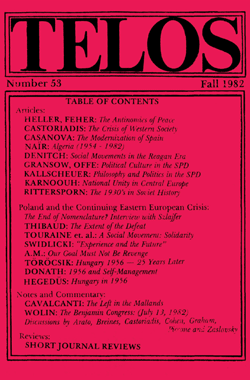As an occasional feature on TELOSscope, we highlight a past Telos article whose critical insights continue to illuminate our thinking and challenge our assumptions. Today, Lewis West looks at Ferenc Fehér and Agnes Heller’s “The Antinomies of Peace” from Telos 53 (Fall 1982).
 Utopia is necessary: it alone “can rescue a very limited reality” (16). Without it we are shackled by the thoughts of others, confined within realms of possibility defined by those in power. Peace, disarmament—both can seem idealistic, even ridiculous. But our incredulity results not only from the distance of these concepts from the everyday. We have been taught to understand pacifism as impractical, disarmament as suicide.
Utopia is necessary: it alone “can rescue a very limited reality” (16). Without it we are shackled by the thoughts of others, confined within realms of possibility defined by those in power. Peace, disarmament—both can seem idealistic, even ridiculous. But our incredulity results not only from the distance of these concepts from the everyday. We have been taught to understand pacifism as impractical, disarmament as suicide.
That does not, however, mean that every utopia is desirable. In “The Antinomies of Peace,” Ferenc Fehér and Agnes Heller engage seriously with peace and anti-nuclear movements. They neither dismiss nor embrace these groups’ politics: these revolutions promise redemption, but can “degenerate into an intolerant and destructive force as well” (6). Fehér and Heller take utopia seriously, and they treat its realization with both caution and respect.
At first, they doubt the possibility of peace, as radicals describe it. They write:
Thus, no peace movement which transcends the level of the zoological position can be absolutely pacifist. In other words, the ultimate end of the peace value must mean more than bare subsistence, as it already encompasses a certain type of demand for a “good life”—not just for a “mere life.” And, despite the fact that peace has indeed become an empirical universal, no one can deny that there is still a contradiction between a good life and a mere life, that violence and wars cannot be entirely eliminated from our actions if we seek something more than survival. (10)
We can read this as an admonishment of total pacifism and a call for more active intervention in conflicts deemed to violate our moral values. But it also contains a more subtle point, one more useful in an era when so-called humanitarian interventions have proved ineffective, unsustainable, and implicated in neocolonialist and militaristic projects. It helps to read Fehér and Heller’s description of “mere life” alongside Hannah Arendt’s view of labor in The Human Condition: “It is indeed the mark of all laboring that it leaves nothing behind, that the result of its effort is almost as quickly consumed as the effort is spent.”[1] Arendt’s trouble with such an ephemeral type of existence—one we can equate with Fehér and Heller’s “mere life”—is that it does nothing to shape the world, produces nothing which brings individuals together.
Fehér and Heller also repudiate this life; they equate it with absolute pacifism. They elaborate: “If nothing is worth dying for, in other words, if bare, value-free subsistence, and not peace, is the supreme value, then nothing is worth living for in that there is no transcendence, no ‘beyond’ to mere living. . . . This is the ethics of a slave” (9). An uncompromising embrace of nonviolence turns inward, sacrificing all political interaction for the sake of a single ideal. It rejects the appeals of others, does nothing to further ethical conversation and moral community. It represents personal ethics and symbolic politics, neither of which, to Fehér and Heller, offers a useful model for modern life.
The authors also voice hesitations in their discussion of anti-nuclear movements. Noting the possible dangers of a collapse of the Cold War “deterrent factor,” they write: “the anti-nuclear movements usher in a new epoch of conventional world-wars of unheard-of dimensions” (13). Yet this harrowing prophecy is not a condemnation. They continue: “A world of tragic choices is full of bloodshed, but infinitely better than a world of no choices. . . .” (13). Anti-nuclear movements, even at their most radical, preserve a sense of human power and allow for multiple futures. That these futures may horrify us only reflects an unfortunate reality.
This stress on choice, and on multiplicity, represents Fehér and Heller’s most valuable message for politics today. They criticize absolute pacifism for its neglect of true political conversation and its refusal to acknowledge differing voices. Likewise, they laud anti-nuclear movements for preserving even the most anguishing of choices. Each movement must “combine the principle of peace with that of democracy. Democraticization and denuclearization have to go hand in hand” (16). Every radical group must embrace some form of ethical, open conversation.
Our current situation differs drastically from the Cold War atmosphere that permeates Fehér and Heller’s piece. Yet this in some ways makes their message even more crucial. We must remember that democracy is an ethic that entails a plurality of voices. We must remember that, like any ideal, it both calls us to action and illuminates our faults. Only in realizing this can we escape our “very limited reality.”
Notes
1. Hannah Arendt, The Human Condition (Chicago: University of Chicago Press, 1958), 87.



